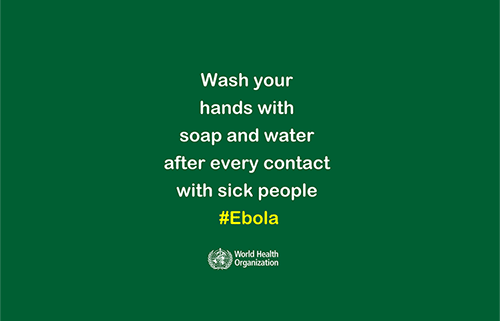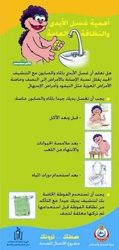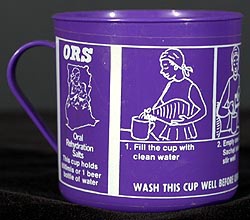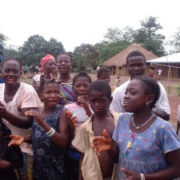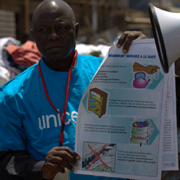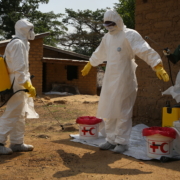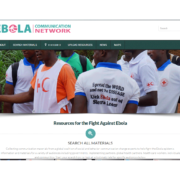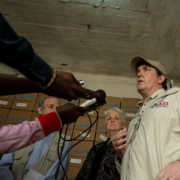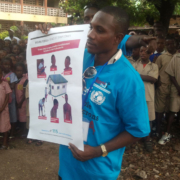Ebola, Hand-washing and Oral Rehydration Therapy
The question of Ebola communication has focused mainly on, well, Ebola. But beyond knowledge of how the virus is spread and what to do if you get it, there are practices and skills that public health people have been communicating about for decades that can help with prevention and, possibly, survival. Two big ones are hand-washing and Oral Rehydration Therapy (ORT).
Hand-washing is one of those crucial life-saving practices that doesn’t get as much attention as it deserves, and which is not always as simple as it seems due to lack of access to clean water and soap. Even when it is simple, it often isn’t done, as anyone spending time in an airport restroom can attest. No one is suggesting that hand-washing alone is going to get the virus under control. Indeed, there is no research yet on the exact role hand washing plays in halting the spread of Ebola. Regardless of how effective hand-washing is in preventing the spread the virus, we do know that it is crucial in preventing the spread of other diseases, like influenza, that can look like Ebola. The fewer people going to doctors with flu in the coming months – whether in Baltimore or Bamako – the better.
So how to communicate on hand-washing at a time like this, or any time? Jeffrey Sachs has an article on hand-washing in the age of Ebola, and a program to teach kids to wash their hands five times a day. Since hand-washing is a habitual behavior it makes sense to get kids early, and kids also bring healthy habits home to share with their families.
Hand-washing has also been promoted as part of integrated health programs that support multiple healthy behaviors and the health services that support them. This is a poster from Nigeria, one of a series on hand-washing:
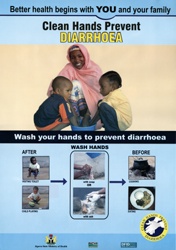
It has a simple, direct message, a call to action, and clear visuals. In other outbreak situations we have also turned to communication to promote hand-washing as a key tool in stopping the spread of disease, such as H1N1 – here is an example of a material from Egypt that gets a little extra help from a cute Sesame muppet.
Another old-school intervention that could be helpful now is Oral Rehydration Therapy. ORT (also known as oral rehydration salts or oral rehydration solution) may have a more direct effect on Ebola survival, though again there is little evidence to show what role ORT can or should play in the community setting. Given the uncertainly, what we can communicate is the use of ORT when anyone is sick with diarrhea and vomiting – the same message public health authorities have been giving for years. For families waiting for care at an Ebola Treatment Unit for their loved ones in affected countries, knowing to spike the water with ORT could make a difference to survival. In Nigeria, doctors who lived through their infections with Ebola attributed their survival to the early and copious use of ORT.
There are reports of people using coconut water for hydration in Sierra Leone and elsewhere. Coconut water has the advantages of being clean (unless contaminated when opening the coconut) and having some minerals and sugars. However, previous studies show it does not have sodium or enough glucose to be used instead of the sugar/salt solution.
How to use ORT has been communicated in different ways over the years. That old stand-by of community health workers and Peace Corps Volunteers, Where There is No Doctor, gives the following recipe for “Rehydration Drink”: a half level teaspoon of salt and eight level teaspoons of sugar in a liter of clean water. It should taste no saltier than tears. You can add fruit juice or coconut water for added oomph.
This simple, classic poster from India (from 1990!) illustrates ORT communication.
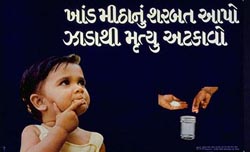
Communication for ORS doesn’t have to be a print material, either: check out this cup with instructions written on it.
And finally, communication on both hand-washing and ORT is encouraged and facilitated by the WHO. Here is link to quick messages and tweets on Ebola, hand-washing, and ORT. The messages are downloadable as print ready posters, including one with the recipe for oral rehydration solution.

